1. Why do we need to keep warm and nourish yin in winter?
Winter is the time when it is necessary to keep the body warm. In Traditional Medicine, winter belongs to the Water element, corresponding to the Kidney organ, the "root of innate" that plays an important role in the body.
When the weather turns cold, cold evils easily invade, causing kidney yang to weaken, affecting the function of qi transformation, manifesting as cold hands and feet, frequent urination at night, back pain and weak knees, slow digestion and reduced immunity.
Therefore, keeping the body warm in winter not only helps repel cold evils but also protects the Kidney Yang - the energy source that helps maintain body temperature and vitality in winter.
The dry nature of winter also affects the Lungs. The Lungs govern Qi, the skin, and regulate body fluids. Cold and dry climates cause loss of body fluids, leading to a state of Lung Yin deficiency with symptoms such as dry cough, dry throat, dry nose, and chapped skin.
When the lung's function of expulsion and descent is impaired, the body is susceptible to wind-cold, leading to colds, sore throats, coughs and respiratory diseases. Therefore, nourishing yin and the lungs plays an important role in replenishing body fluids, moistening the mucous membranes and strengthening the respiratory barrier in winter.
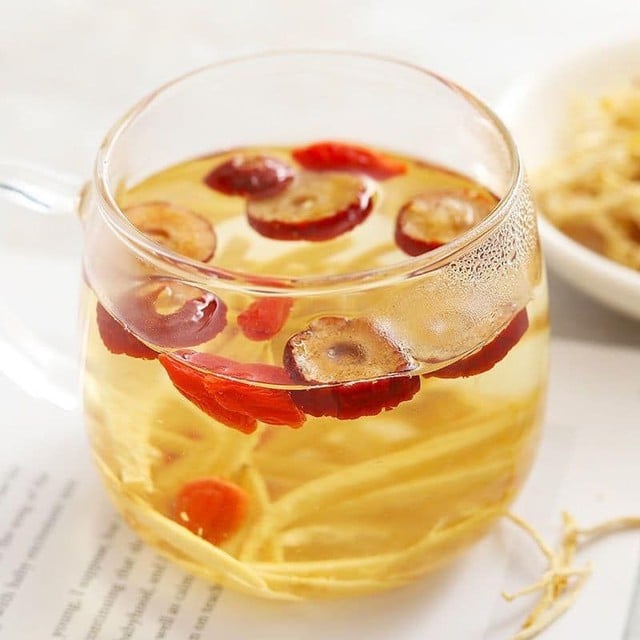
Ginger, red apple and wolfberry tea helps keep the body warm in cold weather.
2. Herbal teas to keep you warm and nourish yin in winter
1. Ginger tea, red apple, wolfberry
Ingredients: 3 - 5 slices of fresh ginger, 3 - 5 red apples, 1 teaspoon of goji berries, honey optional.
Directions: Boil ginger and red dates for 5-7 minutes. Turn off the heat and add wolfberries and let it steep for another 3 minutes. Drink while still warm.
Uses: Ginger helps warm the middle and dispel cold. Red dates replenish qi and blood, and wolfberry nourishes yin and nourishes the liver and kidneys; suitable for people with cold stomach, cold hands and feet, and fatigue.
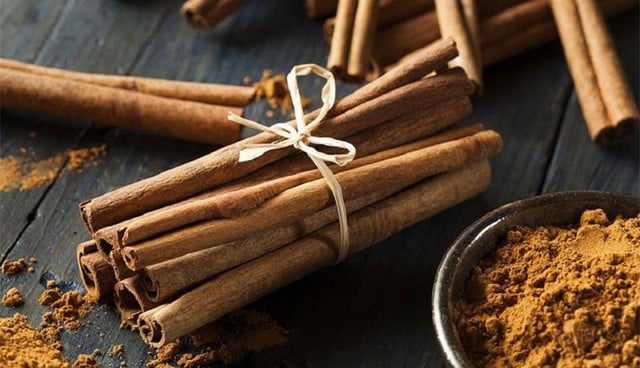
Cinnamon and tangerine peel make a tea suitable for people with stagnant qi and cold stomach.
2. Cinnamon tea, tangerine peel
Ingredients: 1 - 2 small cinnamon sticks, 3 - 5g tangerine peel, can add 1 - 2 slices of ginger, rock sugar if needed.
How to make: Boil cinnamon and tangerine peel for 5 minutes to release the aroma, turn off the heat, add a few slices of ginger and rock sugar.
Uses: Cinnamon warms the meridians and clears the yang; tangerine peel regulates qi and dissolves phlegm; suitable for people with stagnant qi, cold stomach, and poor digestion.
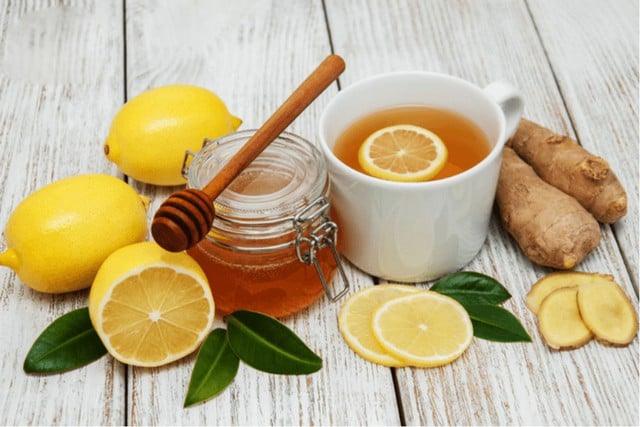
Ginger, lemon, and honey tea is suitable for people with dry coughs, dry throats, and colds.
3. Ginger, lemon, honey tea
Ingredients: 3 slices of ginger, 1 - 2 tablespoons of lemon juice, 1 tablespoon of honey.
How to make: Boil ginger for 3-5 minutes, let it warm then add lemon and honey.
Uses: Ginger disperses cold, warms the spleen and stomach; lemon produces body fluids, moistens the lungs; honey nourishes yin, moistens dryness; suitable for people with dry cough, dry throat, and cold body.
4. Astragalus and wolfberry tea
Ingredients: 10g astragalus, 1 teaspoon goji berries.
Directions: Wash astragalus and wolfberry, simmer for 10 minutes, turn off heat and soak for another 3 minutes.
Uses: Astragalus replenishes qi and increases resistance; wolfberry nourishes yin and nourishes the liver and kidneys. Drink in the morning or early afternoon to help prevent colds.
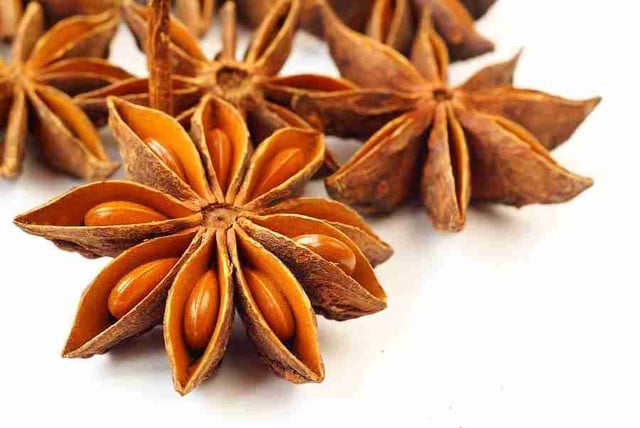
Star anise combined with cinnamon and ginger makes tea that warms the body and dispels cold.
5. Cinnamon, star anise and ginger tea
Ingredients: 1 small cinnamon stick, 1 - 2 star anise flowers, 2 slices of ginger.
Directions: Boil cinnamon and star anise for 7 minutes, add ginger for 1-2 minutes then turn off the heat.
Uses: Star anise warms the body, dispels cold; combined with cinnamon and ginger helps reduce cold hands and feet, cold back, nocturia and winter respiratory diseases.
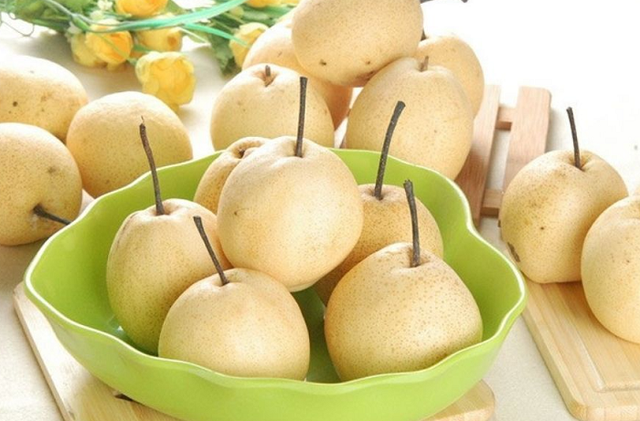
Pear combined with wolfberry and honey in tea is useful for people with dry cough, dry lips, constipation.
6. Pear tea, wolfberry, honey
Ingredients: 1 small pear, 1 teaspoon goji berries, enough honey.
How to make: Boil pear for 10 minutes, turn off the heat and add wolfberry and honey.
Uses: Pears nourish yin and moisten the lungs; wolfberries produce body fluids and nourish the kidneys; honey moistens the intestines and reduces sore throat; Useful for people with dry coughs, dry lips, and constipation.
3. Notes when using tea
- People who are prone to "internal heat" or yin deficiency should reduce the amount of ginger/cinnamon or dilute it.
- Herbal tea is only a support, not a substitute for a warm diet, warm clothing and a reasonable lifestyle.
- If using astragalus or wolfberry regularly, consult a Traditional Medicine practitioner for appropriate dosage.
- Avoid use if you are taking blood pressure medication, diabetes medication or have kidney disease. Consult a traditional medicine practitioner to ensure safety.
See more popular articles:
Source: https://suckhoedoisong.vn/6-loai-tra-thao-duoc-giup-giu-am-co-the-trong-mua-dong-169251121111048409.htm
















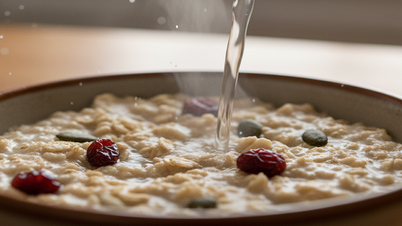













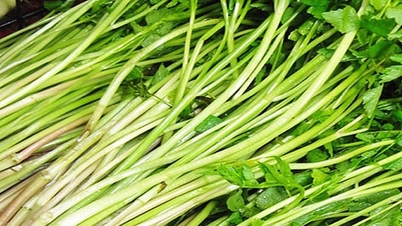






























































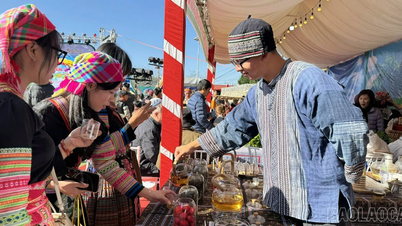
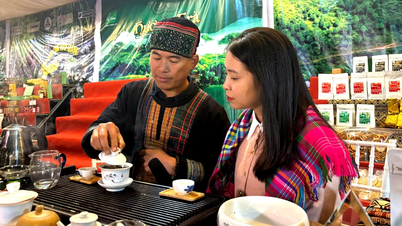















Comment (0)